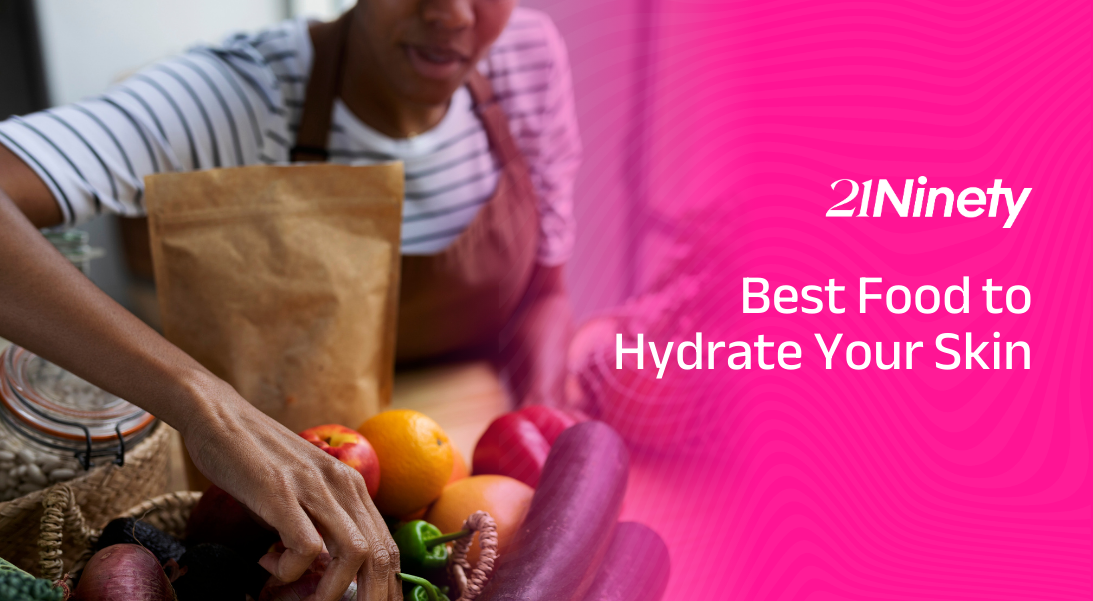Healthy skin is not just about what you put on it, but also what you are putting inside your body. A healthy diet has a lot to do with whether or not your skin is dry and dull or moisturized and glowy.
Everyone wants healthy skin, but not everyone is prioritizing a healthy diet to boost their skin’s hydration. If your skin is flaky, red, irritated, or scaly, those are all signs that you are in need of moisture. The moisture barrier of your skin is made up of fatty acids, cholesterol, and ceramides, and is responsible for keeping your skin hydrated. When it is dehydrated, it can become compromised or damaged. But don’t worry! It’s possible to restore your skin to health with a simple change in diet.
“I can confirm that your skin’s appearance is a reflection of your overall health and well-being,” said Dr. Hope Mitchell, board-certified dermatologist and founder of Mitchell Dermatology. “It’s important to nourish your skin from the inside out by maintaining a balanced diet.”
What Dry Skin Might Be Signaling
Dry skin looks dull, rough, and flaky. It may have a tight or uncomfortable feeling, and fine lines or cracks can become more pronounced.
“When skin is dehydrated, the skin’s surface can appear uneven,” Mitchell explained. “It might even have red or irritated patches due to the lack of moisture and compromised barrier function.”
If your skin is feeling dry and dull, it might be signaling a few different things. Most commonly, dry skin means your skin is lacking hydration. This can result from not drinking enough water or from consuming diuretic beverages like coffee and alcohol. Mitchell explained that these types of drinks deplete your body’s moisture levels.
Dry skin can also be a sign of an imbalance in your diet. Essential fatty acids, vitamins A, C, and E, and antioxidants play crucial roles in maintaining healthy, supple skin. A deficiency in these nutrients can lead to dryness and dullness.
Another reason your skin is dry and dull might be due to environmental factors, such as cold weather, low humidity, or exposure to harsh soaps and chemicals.
In contrast, when skin is well-hydrated, it appears smooth, plump, and radiant. The texture is soft and supple, with a natural glow that reflects light evenly. Hydrated skin also tends to have fewer visible fine lines and wrinkles, as the moisture helps to fill out the skin and maintain its elasticity.
Diet Is the Recipe for Healthy Skin
To prevent or counteract dry skin, Mitchell encouraged maintaining a balanced diet of fruits, vegetables, healthy fats, and plenty of water, while also protecting it externally with gentle, hydrating skincare products.
“I often emphasize the importance of nutrition in maintaining skin health,” Mitchell said. “To help hydrate your skin, I recommend incorporating foods rich in water content and essential nutrients into your daily diet.”
Every day, make an effort to consume a variety of hydrating foods daily. This will enhance your skin’s moisture levels and overall appearance. Start with fruits and vegetables like cucumbers, watermelon, oranges, and strawberries. These fruits have high water content and boost your skin’s hydration. Additionally, fatty fish like salmon and mackerel are excellent sources of omega-3 fatty acids, which help maintain the skin’s lipid barrier and prevent moisture loss. Make it a goal to consume these foods a few times a week.
Nuts and seeds, such as almonds and chia seeds, provide essential fatty acids and vitamin E. These add to skin hydration and protection. Avocados also support skin health and are rich in healthy fats and vitamins C and E. Don’t forget to add leafy greens like spinach and kale to your regular diet. They are rich in vitamins and antioxidants that promote overall skin wellness.
Skincare in the Summer Heat
In the summer heat, supporting your skin with hydrating foods becomes even more important.
“Incorporating these foods in your daily diet keeps your skin healthy, hydrated, and radiant,” Mitchell said. “
Watermelon, which is about 92 percent water and contains lycopene, protects your skin from UV rays. You can enjoy it sliced or blended with basil and lemon.
Cucumbers, tomatoes, and berries like blueberries, strawberries, and raspberries are also excellent choices, packed with water and antioxidants. They protect your skin from environmental damage and promote a radiant complexion.
Omega-3 rich foods like salmon and walnuts reduce inflammation, maintain the skin’s barrier, and lock in moisture. Leafy greens, such as spinach and kale provide, essential vitamins for skin repair and rejuvenation.
“By consistently following these dietary guidelines, you can ensure your skin stays healthy, hydrated, and glowing year-round,” Mitchell said.
